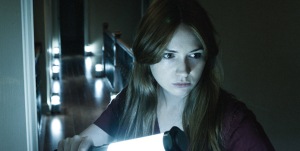
By Gary Dowell
An atypical horror movie that could have been great but instead settled for mediocrity and recycled tropes, Oculus is a frustrating near-miss. By focusing less on gore (though there’s still enough on display to meet minimum requirements) and more on its characters and intriguing premise, it sets up a gripping tale — and then it runs it around in circles before grinding to a disappointing halt.
The movie begins with a teasing flashback of fatal domestic violence before jumping to the present, as Tim (Brenton Thwaites) is released from an asylum after 11 years of incarceration for killing his father (Rory Cochran) following a rampage that resulted in the death of his mother (Katee Sackhoff). He’s picked up by his sister, Kaylie (Karen Gillan, late of Doctor Who and soon to be seen as a blue-skinned baddie in this summer’s Guardians of the Galaxy), who presses Tim into aiding her with a morbid project.
Kaylie believes the traumatic events of their childhood were caused by a haunted mirror, which she has since re-acquired and re-installed in the family home. Tim wants to move on with his life; Kaylie, however wants revenge. She’s hellbent on clearing the family history by proving scientifically and irrefutably that the mirror houses a supernatural entity, and then to smash the living shit out of the thing. To that end she sets up a battery of cameras, computers, timers, plants, a stray dog, and one big, fat Chekov’s Gun of a booby trap.
 Unfortunately for them, whatever is in the mirror is not only a fierce spectral predator, it has a knack for defending itself by screwing with its victim’s perceptions. Cue some initially mind-bending manipulations of what the characters see and hear. Along with that are flashbacks that explain exactly what went down in the home 11 years earlier, which eventually begin to bleed into the present.
Unfortunately for them, whatever is in the mirror is not only a fierce spectral predator, it has a knack for defending itself by screwing with its victim’s perceptions. Cue some initially mind-bending manipulations of what the characters see and hear. Along with that are flashbacks that explain exactly what went down in the home 11 years earlier, which eventually begin to bleed into the present.
It’s a juicy set-up, and the opening act succeeds in hooking us; however, the small, intimate scope of the story ultimately works against it. The story is too constrained, and since it becomes quickly obvious that there’s only one way this tale can end for our protagonists (i.e. badly) watching the events grope along to their inevitable and blatantly telegraphed conclusion gets real tedious, real quick. The cross-cutting between past and present and the eventually co-mingling of the two set up some great possibilities that go unexplored, and only serve to muddle the story. The notion that Tim is the voice of reason and Kaylie might be the crazy one isn’t even given perfunctory exploration.
It’s not a failure by any stretch — the performances are strong (especially from Gillan) and there are a few memorable images — but it never really rises above mediocrity, either. It’s a fractured not-so-fun house mirror version of other, similar spook stories like The Shining or even The Amityville Horror, without the benefit of the thematic elements that made them so memorable.



